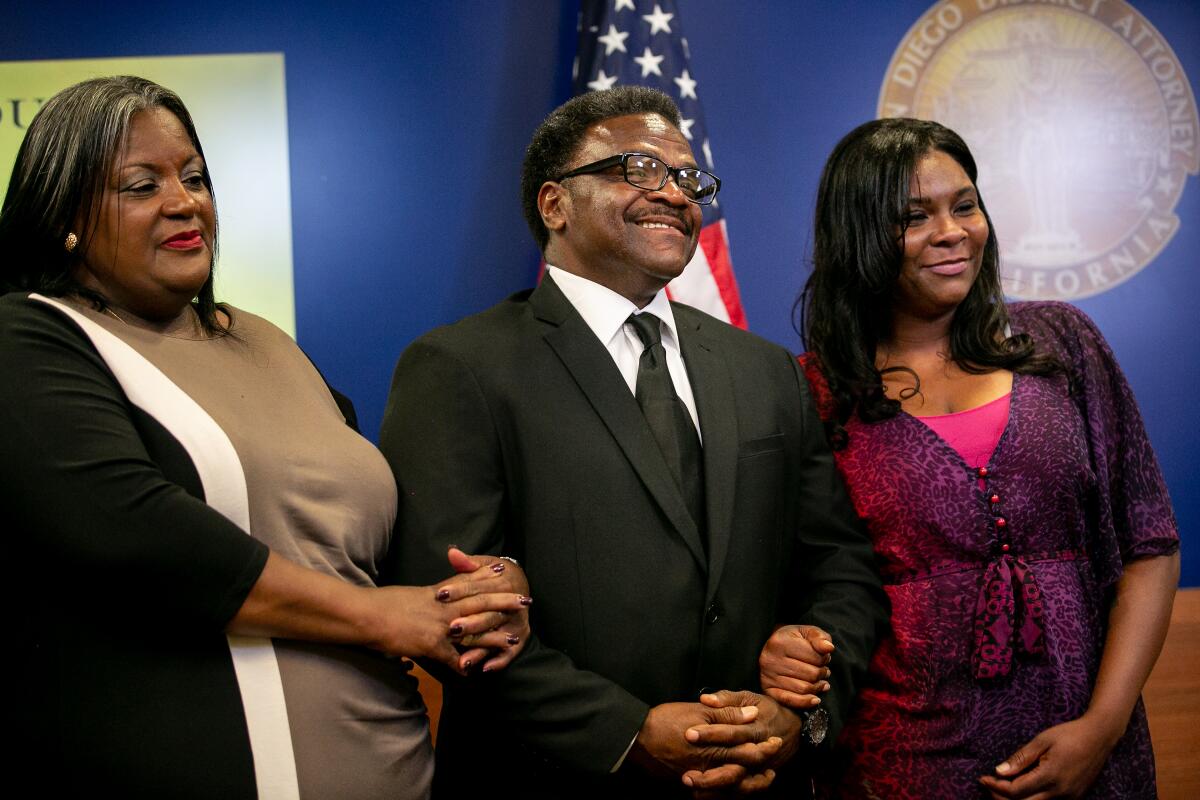Burglar freed after 16 years of a 50-year prison term under new resentencing law

- Share via
SAN DIEGO — Kent Joy Williams spent most of a decade getting high, breaking into people’s homes and going to prison.
In 2003, a San Diego judge looked at Williams’ “three strike” history of convictions and gave him the maximum sentence possible for two new burglaries and auto theft: 50 years to life in prison.
But Thursday, Williams, 57, stood as a free man next to his family, Dist. Atty. Summer Stephan and other officials to showcase his release from prison under a new law that allows prosecutors to take a fresh look at whether a convicted criminal’s sentence was unduly harsh when viewed under current guidelines.
It was the first such release in California under Assembly Bill 2942, which went into effect in January.
Stephan said that today, a prison term of 50 to life would be reserved for murder using a firearm. Judge Albert Harutunian, who imposed the original sentence, reviewed Williams’ case in May and resentenced him to 16 years — time served. Williams was released on parole for a term of three years.
Without the early intervention, Stephan said at a news conference at her office, Williams wouldn’t have been eligible for parole until 2052. The new sentence shaved decades off the time Williams would have spent behind bars.
Williams, facing reporters at the news conference, thanked Stephan, his wife and God for helping him turn his life around.
“You’re looking at a grateful man,” Williams said, noting that he was released from Richard J. Donovan state prison in Otay Mesa about two months ago.
“Being in prison is not a good thing. I had to look at, did I want to spend the rest of my life in prison? I had an encounter with God that changed my life. All of a sudden, doors started opening,” Williams said.
Stephan said Bishop Cornelius Bowser, pastor of Charity Apostolic Church in San Diego, asked last year that her office review Williams’ case. She said prosecutors found that Williams had no history of violent crime, but had committed hot-prowl burglaries — meaning the residents were home at the time — in 1985, 1986 and 1993. His last two burglaries and auto theft were in the North Park neighborhood.
Last year, however, there was no mechanism for Stephan’s office to seek resentencing for Williams. This year, there was.
Assemblyman Phil Ting (D-San Francisco) carried a bill suggested by former San Francisco prosecutor Hillary Blout that allowed prosecutors to seek reduced sentences for suitable inmates and for judges to grant such requests.
Ting said at the news conference that the bill did not require prosecutors or judges to take action, but gave them authority that previously had rested solely with the state Board of Parole Hearings and the Department of Corrections and Rehabilitation.
He said the 115,000 men and women in state custody cost Californians $12 billion a year — far more than what is spent on state universities and colleges.
“Our criminal justice system is not working the way it is should be,” Ting said. “AB 2942 gives people a second chance.”
Blout, also at the news conference, said she has misgivings about the way the parole board operates to keep people in prison rather than let them out.
“We know there are hundreds of thousands of people in prisons who don’t need to be there,” said Blout, now executive director of For the People, a sentencing review project.
Stephan called Ting’s legislation a “tool to carry out legal justice reform.”
Williams had moved forward with his life, Stephan said, by taking advantage of numerous prison programs to further his education, fight drug addiction and mentor other inmates. He also took part in several self-improvement courses.
Prosecutors in Stephan’s office reached out to the last two victims of Williams’ burglaries to let them know he could be in line for an early release. One didn’t respond, and the other said she didn’t oppose his release.
Williams said he has been drug-free for 15 years and looks forward to mentoring others, in prison and out, as a kind of ministry that includes music. He has a full-time job, is enrolled in school and has renewed relationships with his wife, son, daughter, their children and his siblings, he said.
“I will make amends for the rest of my life,” he said.
Repard writes for the San Diego Union-Tribune.
More to Read
Sign up for Essential California
The most important California stories and recommendations in your inbox every morning.
You may occasionally receive promotional content from the Los Angeles Times.














